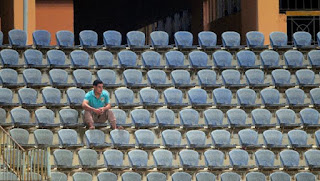Von James M. Dorsey
Why Egypt’s repressive regime considers soccer fans one of its biggest threats.
Ahmed (not his real name) is an Egyptian soccer fan—and a fugitive. He has been expelled from university, convicted twice in absentia, and sentenced to two long terms in prison. He moves around Cairo in a protective crouch, speaks in a low voice to avoid being overheard, and looks furtively over his shoulder as he organizes flash protests against the government of General-turned-President Abdel Fattah al Sisi.Ahmed is a leader of a militant soccer fan group called Ultras Nahdawy (“ultra” is a term for a hardcore soccer fan first used in Italy). Like other such groups, it is constantly in danger of being banned by the Sisi government under new, sweeping anti-terror legislation that targets dissent as much as political violence. Ahmed sees Nahdawy, founded by soccer fans as a Muslim Brotherhood support group in 2012, together with the main anti-Sisi student organization, Students Against the Coup, as a healthy outlet for disaffected youth at risk of radicalization. “We don’t like violence but we are not weak”, Ahmad insists, sipping coffee in a hip café in a middle-class Cairo neighborhood. “Hope keeps us going. We believe that there still are options.
We created options on Tahrir Square. This regime is more brutal [than the Mubarak regime] but there still are options.”Yusuf Salheen echoes Ahmed’s words. A 22-year-old leader of Students Against the Coup, created in 2013 after security forces killed more than 600 people at a Brotherhood sit-in, he studies Islam at Cairo’s prestigious Al Azhar University. Salheen was luckier than Ahmed and more than 1,500 other students who have been detained by security forces, not to mention 2,000 others merely ejected from their institutions of higher learning: He defended himself successfully in a university hearing called to debar him. “We are absolutely concerned that if we fail things will turn violent. Going violent would give the regime the perfect excuse. We would lose all public empathy. We hope that Egyptians realize that there are still voices out there that are not giving up and are keeping protests peaceful despite all that has happened”, he said.
Continue reading “Soccer Is Politics”
![Ultras demonstrieren gegen U-Haft - buten un binnen | regionalmagazin [Quelle: Radio Bremen] Ultras demonstrieren gegen U-Haft - buten un binnen | regionalmagazin [Quelle: Radio Bremen]](http://www.radiobremen.de/fernsehen/buten_un_binnen/clipbild204752_v-content16x9.jpg)




